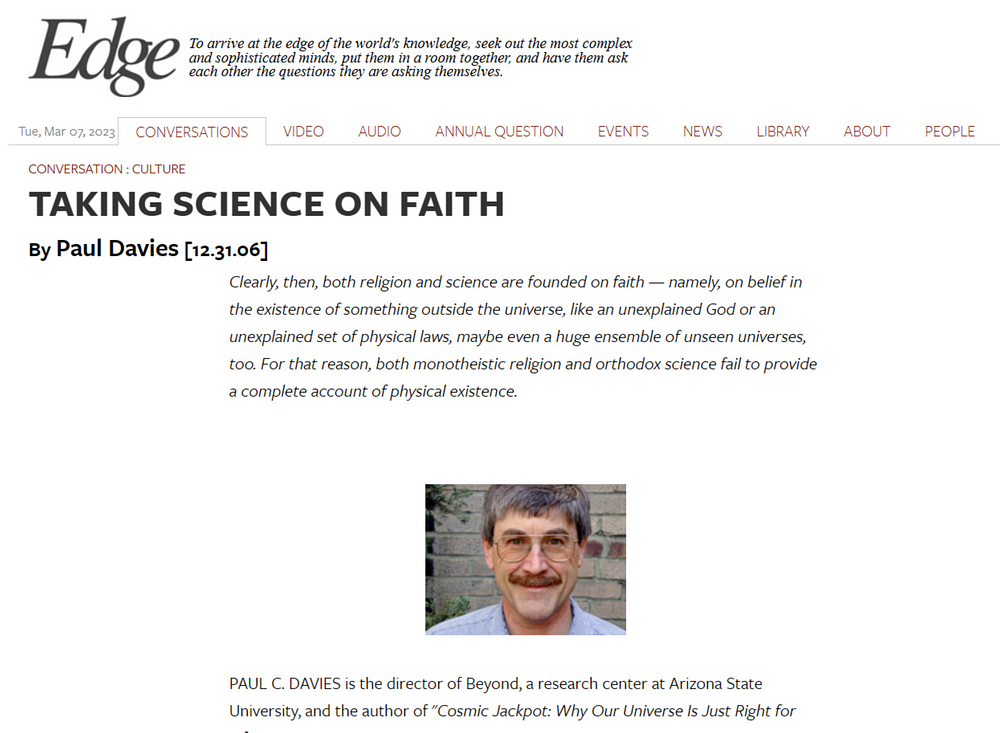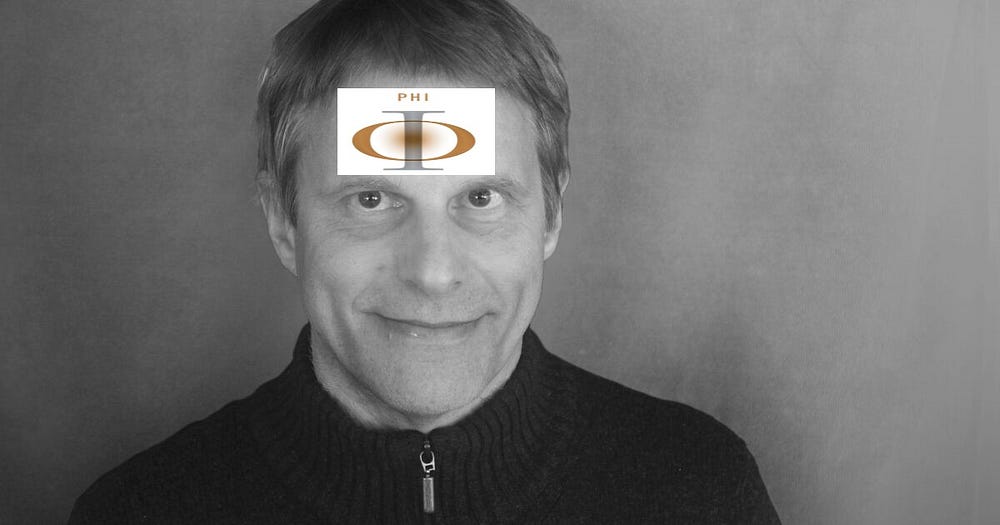The following essay is a response to Paul Davies’s op-ed article ‘Taking Science on Faith’, which was published by the New York Times. The word “faith” (at least in this context) seems to have become almost (to use a word which Davies uses) meaningless. Indeed, it’s often used as a rhetorical gimmick. On the other hand, it’s much harder to use the word “faith” rhetorically against religious people or monotheists because they often use that word to refer to their own stances on what it is they believe.

Paul Davies’s article is an old one. It was published in 2007. It was also published by Edge-org under the same title. That publication included ten responses from a group of scientists called The Reality Club. The responders included Jerry Coyne, Nathan Myhrvold, Lawrence Krauss, Scott Atran, Sean Carroll, Jeremy Bernstein, PZ Myers, Lee Smolin, John Horgan and Alan Sokal. (These responses, and Davies’s original article, can be found here.)
I decided not to read any of these responses until I’d finished my own response to Paul Davies’s article. I did that because I didn’t want to be too influenced or dependent on what these scientists had written. However, I did later come to note that it was odd that all the responses are negative (or critical) in nature. (Not all the responses are equally negative.) So you’d have thought that Edge-Org (or its founder and editor John Brockman) would have included at least one positive — even if only mildly so — response to Davies’s article.
In any case, Davies himself responded to the responders, and I didn’t read that either until after I’d finished my own response.
Is Science “Founded on Faith”?
There’s a big problem with the central idea in Paul Davies’s article.
If the word “faith” is applicable to all domains, then there’s virtually no point in using that word at all. That said, Davies didn’t apply the word “faith” to all domains in his article: he applied it only to science and religion. Yet surely any reliance on faith is less likely in science than in all other domains. Indeed, isn’t that (as it were) faithlessness deemed to be a central feature of science?
Clearly, Davies doesn’t believe that.
Thus, the word “faith” (at least in this and in similar contexts) seems to have become almost (to use a word that Davies himself often uses) meaningless. It lacks any semantic content. Indeed, it’s often used as a simple rhetorical gimmick. On the other hand, it’s hard to use the word “faith” rhetorically against religious people or monotheists because they use that word to refer to their own stances on what it is they believe.
Basically, then, Davies’s use of the words “faith in science” is an example of a tried-and-tested technique which many critics of science (along with critics of materialism/physicalism and evolution) employ on a frequent basis.
To put it in its most simple form.
If a scientist, “evolutionist” or atheist accuses a religious or “spiritual” person of x, then the latter will accuse the former of being x too. Thus, we have lots of critics who’ve accused scientists, materialists, evolutionists and/or atheists of having “faith” in materialism, evolution and atheism… or, in Davies’s case, faith in science. Indeed, some people have also claimed that science, atheism, evolution or materialism “is a religion”.
This happens at a lot at infant and junior schools. That is, when a little kid accuses another little kid of being x, then that other little kid accuses the accuser of being x too. Indeed, the author and businessman Deepak Chopra is a very good example of one of the people who adopt this strategy
Yet it can be argued that few religious or spiritual persons, New Agers, etc. genuinely do believe that science, materialism, atheism or evolution is literally a religion or that people “believe in” science, materialism, atheism or evolution purely on faith. Of course, it must be admitted that there will be exceptions to this in that at least some scientists, materialists, atheists or evolutionists will use science, materialism, atheism or evolutionary theory as a literal substitute for religion. Yet these comparisons between religion and people’s commitment to science, materialism, atheism and/or evolution are often so vague, tangential and rhetorical that, in most cases, I doubt that these claims are even believed by most of the people who actually state them.
Still, to claim that scientists, materialists, atheists and evolutionists have faith in what they believe (or that “science is founded on faith”) is extremely useful and it scores many ideological and psychological points. It will also help sell books, articles, etc.
More particularly, Davies tells us that
“both religion and science are founded on faith — namely, on belief in the existence of something outside the universe”.
Davies believes that the claim above is clear. (Davies writes: “Clearly, then, both religion and science are founded on faith.”) So does Davies have faith in his idea that science is founded on faith?
In terms of detail.
It doesn’t follow that because one has no direct evidence for something (or that something hasn’t been observed), then believing in that something simply must be “founded on faith”. What’s more, it may not even be a case of believing in x: it may simply be a case of provisionally accepting x. (Unless, that is, these two phrases are taken to be synonymous.) On the other hand, religious people and monotheists (on the whole) don’t provisionally accept sacred texts, central doctrines, moral rules, the existence of God, etc. — they believe in these things. Indeed, they often take them to be categorically true.
It can be freely admitted that there are all sorts of things that non-religious people have no direct or indirect evidence for (or which we haven’t observed), but which they accept as being the case. However, can we also deem such provisional acts of acceptance to be (to use Davies’s words) founded on faith?
For example, no one can observe the historical past, the contents of other minds, numbers, the inner core of the Earth, etc. We may have indirect evidence for some of these things. However, the beliefs which most people (especially scientists) have about them still aren’t founded on faith. (Testimony is important in some — or even many —of these and similar cases.) Unless, that is, the word “faith” is being used so broadly and, perhaps, indiscriminately, that it hardly has any purchase.
All that said, some philosophers have indeed argued that most people do have (some kind of) faith in, say, “other minds”, numbers, the past, etc. (i.e., even when the word “faith” isn’t often used by such philosophers). That said, I don’t believe that Davies has these kinds of philosophical cases in mind.
So what do scientists have faith in?
Davies claims that scientists have faith in
“the existence of something outside the universe, like an unexplained God or an unexplained set of physical laws, maybe even a huge ensemble of unseen universes, too”.
Why does Davies believe that scientists believe “in the existence of something outside the universe”? More clearly, why must an “unexplained set of physical laws” be outside the universe? Has Davies logically and/or philosophically deduced that this is what scientists must (unconsciously?) believe? Alternatively, does Davies think that this is the consequence of what it is scientists do believe?
A logical (or otherwise) consequence of believing a set of things may not itself be believed. Thus, there’s little evidence that all, most or even many scientists (or physicists) believe in the existence of something outside the universe. (Unless the Platonic realm of mathematics is outside the universe — as we’ll see later.)
Another problem is that Davies often uses rhetorical and poetic words and phrases.
Paul Davies’s Rhetoric?
Paul Davies’s rhetorical and poetical words/phrases muddy the water. That is, they simply don’t help. What’s more, in this particular debate at least, words like “meaningless”, “absurd”, etc. are often thrown around like confetti.
That said, this isn’t an argument against using poetry and rhetoric in prose about science, philosophy, religion, etc. (It’s probably virtually impossible to bypass such things anyway.) And it can be freely admitted that the kind of scientists Davies is arguing against sometimes use equal amounts — or even more — rhetoric and poetry. (Jerry Coyne is a good example.) The point is that readers and writers should always be aware that rhetoric and poetry can be very unhelpful because they’re designed to tap into the readers’ emotions (as well as sell books, etc.). And, as stated, they can also muddy the water.
[Some people argue that “colourful prose” actually enables understanding when it comes to scientific and philosophical matters.]
So now take this passage from Davies:
“You couldn’t be a scientist if you thought the universe was a meaningless jumble of odds and ends haphazardly juxtaposed.”
Why did Davies use the word “meaningless”? Indeed, why did he write the words “jumble of odds and ends haphazardly juxtaposed”?
If the universe isn’t “meaningless”, then it must be meaningful.
Yet that doesn’t help either because we now need to know what a meaningful universe is.
So what is a meaningful universe?
Davies does (kinda) explain what a meaningful universe is elsewhere in his writings. (Primarily in his book The Goldilocks Enigma: Why is the Universe Just Right for Life?, also called Cosmic Jackpot.) However, he doesn’t really do so in his article for the New York Times.
In that sense, then, Paul Davies can be compared to the author and strong critic of science David Berlinski. (The two share many views on the subjects tackled in this essay.) Thus, what the biologist Jerry Coyne (who was mentioned a moment ago) wrote about Berlinski can also be applied to Davies. Thus:
“Science has no answers to ‘The Big Questions’ like ‘why is there something instead of nothing?’ (the answer that ‘it was an accident’ is fobbed off by Berlinski as ‘failing to meet people’s intellectual needs’, which of course is not an answer but a statement about confirmation bias); ‘where did the Universe come from?’; ‘how did life originate?’; ‘what are we doing here?’, ‘what is our purpose?’, and so on. Apparently Berlinski doesn’t like ‘we don’t know’ as an answer, but as a nonbeliever I’d like to know his answer! He has none; all he does is carp about science’s ignorance.”
However, Davies isn’t an outright contrarian like David Berlinski. He’s also a fine physicist and writer. What’s more, Davies’s philosophical analyses and questions have much more meat in them than anything Berlinski has ever offered the public. Indeed, Berlinski often comes across as being all about contrarianism, literary style and politics. Davies, on the other hand, does use rhetoric, but he doesn’t exclusively rely on it.
To get back to Davies’s own rhetoric.
Davies also tells us that when “he was student, the laws of physics were regarded as completely off limits”. That’s clearly false. The laws couldn’t have been off limits because they’re at the heart of all physics.
So Davies must have meant the following:
Philosophising about the laws of physics was off limits.
Davies must have known that because he also told us that philosophical questions weren’t deemed to be “scientific question[s]” by the scientists he had in mind. He also claimed that other scientists (perhaps some of the same ones) believed that “nobody knows” the answers to his philosophical questions.
He may be right about all that. It depends…
Davies also used the word “absurdity”.
Paul Davies and the Absurd Universe
Davies wrote:
“If so, then nature is a fiendishly clever bit of trickery: meaninglessness and absurdity somehow masquerading as ingenious order and rationality.”
Again, why use the word “absurdity”? (Davies also used the words “reasonless absurdity”.)
The word “absurdity” (or “absurd”) is used all the time in this debate about the nature of the Universe and our relation to it. However, it’s very easy to view it as being rhetoric or poetry.
The word “absurd” can be defined as “extremely silly” and/or “ridiculous”. Thus, it would be silly and ridiculous for Davies to say the laws of nature (or the universe’s “order”) is extremely silly or ridiculous when viewed in the way Davies is arguing against.
So perhaps Davies had something else in mind.
Take the existentialist position on “absurdity” as the Universe “having no rational or orderly relationship to human life” (see here). Yet it can be presumed that Davies would say that this isn’t his position either. That’s primarily because he doesn’t like the term “anthropic” because it focuses (too much?) on human beings and their own relation to the Universe.
[In his book The Goldilocks Enigma, Davies wrote: “The term is an unfortunate misnomer, because ‘anthropic’ derives from the same Greek root as ‘man’, and nobody is suggesting that the principle has anything to do with humans per se. [] The British astrophysicist Brandon Carter, who first use the word in this context, once remarked that had he known the trouble it would cause, he would have suggested something else — the ‘biophilic’ principle.”]
Indeed, since existentialists have just been mentioned, I can’t help thinking that Davies’s take on the absurd (or on absurdity) chimes in very well with what absurdist playwrights and authors (see here) had in mind way back in the 1950s. To them, absurdity is the “condition in which human beings exist in an irrational and meaningless universe”. What’s more, in this irrational universe, “human life has no ultimate meaning”.
Ironically, it can be argued that the Absurdists were simply embracing religious ways of thinking. And, in parallel, Davies believes that the nature of the Universe is indeed absurd if what he believes is false. This means that the absurdists and/or existentialists embraced absurdity. Davies, on the other hand, is attempting to find an alternative to it. That is, he is searching for the Universe’s meaning.
Perhaps, then, Davies’s word “absurdity” is a simple synonym for “unreasonableness” or “reasonlessness”. Indeed, that may chime in with his position because he uses these words too.
Yet the word “absurd” isn’t often used as a simple synonym of “unreasonable” or “reasonless” — and Davies knows that.
[I personally don’t believe that absurdity should be either embraced or rejected. The word “absurdity” simply isn’t useful or accurate in this context.]
Davies use of the word “absurdity” can also be tied in with his broader position on monotheism and its equally unacceptable (to him) alternatives.
Conclusion
Paul Davies’s overall aim is to offer us a cosmological alternative to both (religious) monotheism and absurd atheism. He writes:
“It seems to me there is no hope of ever explaining why the physical universe is as it is so long as we are fixated on immutable laws or meta-laws that exist reasonlessly or are imposed by divine providence.”
Then, immediately, Davies offers his own alternative:
“The alternative is to regard the laws of physics and the universe they govern as part and parcel of a unitary system, and to be incorporated together within a common explanatory scheme.”
More clearly, Davies says that “the laws should have an explanation from within the universe and not involve appealing to an external agency”. This clearly rules out any reliance on a monotheistic (or even Deistic) God. Yet many scientists, philosophers and others see Davies’s position as one which simply masquerades as not being religious or monotheistic. In other words, his detractors claim that Davies smuggles monotheism and religion back in through the back door…
That’s not a surprising position to take when seen within at least certain contexts. That’s primarily because “design arguments” have, after all, been used by theologians and religious scholars for centuries. (See ‘The Fine-Tuning Design Argument’ from the Discovery Institute, which classes all the positions which reject fine-tuning and the reality of design as “atheistic”.) Of course, Davies doesn’t believe that his arguments rely on God’s design. Yet, arguably, the long tradition which emphasises design is what Davies is attempting to update with new science and even new data.
My flickr account and Twitter account.










